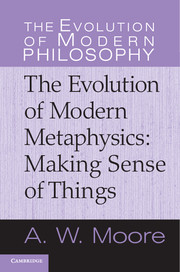Book contents
- Frontmatter
- Contents
- Preface
- Introduction
- Part One The Early Modern Period
- Part Two The Late Modern Period I
- Chapter 8 Frege
- Chapter 9 The Early Wittgenstein
- Chapter 10 The Later Wittgenstein
- Chapter 11 Carnap
- Chapter 12 Quine
- Chapter 13 Lewis
- Chapter 14 Dummett
- Part Three The Late Modern Period II
- Bibliography
- Index
Chapter 11 - Carnap
The Elimination of Metaphysics?
from Part Two - The Late Modern Period I
Published online by Cambridge University Press: 05 June 2012
- Frontmatter
- Contents
- Preface
- Introduction
- Part One The Early Modern Period
- Part Two The Late Modern Period I
- Chapter 8 Frege
- Chapter 9 The Early Wittgenstein
- Chapter 10 The Later Wittgenstein
- Chapter 11 Carnap
- Chapter 12 Quine
- Chapter 13 Lewis
- Chapter 14 Dummett
- Part Three The Late Modern Period II
- Bibliography
- Index
Summary
Logical Positivism
Here is a cartoon sketch. Hume was appalled by the metaphysical excesses of his predecessors. He opposed them with a radical empiricism. But Kant thought that Hume’s empiricism was too radical. On Hume’s account, earlier metaphysicians had not only professed to know what they could not know, they had professed to know what they could not even think. Kant believed that they were very often guilty as charged in the first of these respects, much less often in the second. He opposed them with something more subtle. But the subtleties of Kant’s view, combined with its own uneasy relation to itself, meant that many of his successors felt that they now had license to try to make sense of things in ways that Hume would have regarded as far more egregious than anything he had been trying to combat in the first place. And so it was that, in the twentieth century, within the analytic tradition, there was a neo-Humean backlash, a reversion to a radical empiricism that could be used to mount a full-scale semantic attack on these new excesses, reducing them to the status of literal meaninglessness. This was the movement known as logical positivism.
That this movement should have arisen in analytic philosophy is hardly surprising. The Humean attention to sense that it demanded was very much of a piece with the attention to sense that had come to be one of the defining features, if not the defining feature, of analytic philosophy. By the same token logical positivists were able to make use of various analytic tools, in executing their Humean project, that had not been available to Hume himself, most notably the tools of the new formal logic that Frege had established. In sum – and remember, this is a cartoon sketch – logical positivism was Humeanism made analytic.
- Type
- Chapter
- Information
- The Evolution of Modern MetaphysicsMaking Sense of Things, pp. 279 - 301Publisher: Cambridge University PressPrint publication year: 2011



